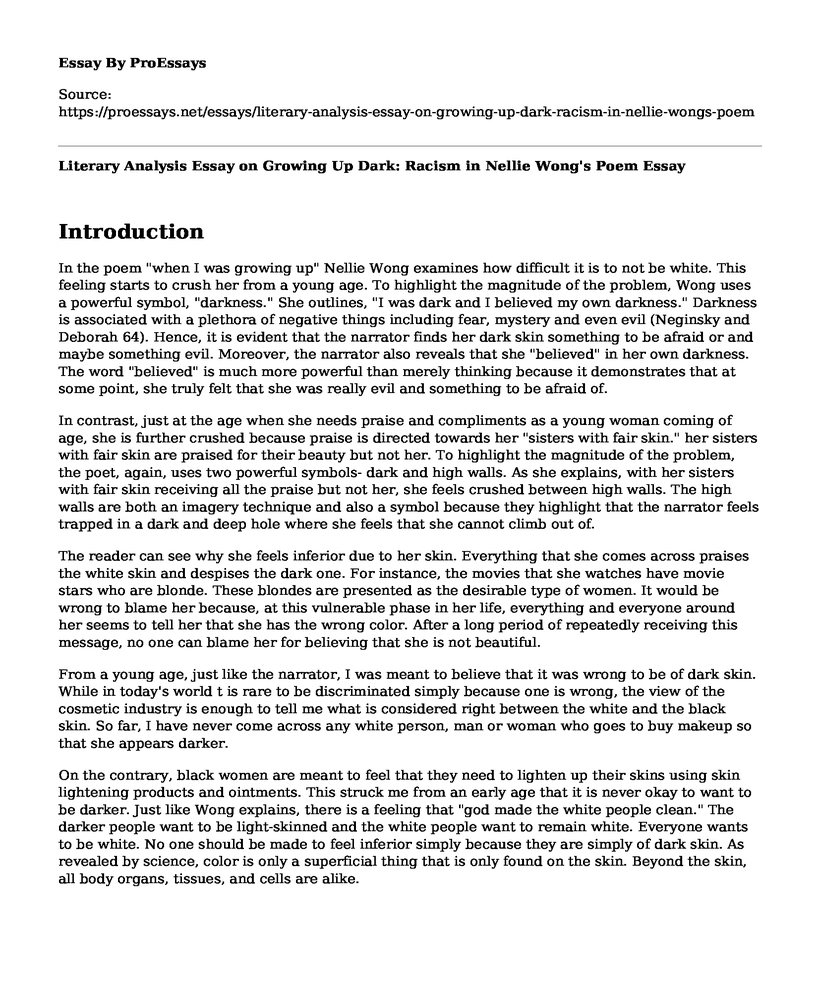Introduction
In the poem "when I was growing up" Nellie Wong examines how difficult it is to not be white. This feeling starts to crush her from a young age. To highlight the magnitude of the problem, Wong uses a powerful symbol, "darkness." She outlines, "I was dark and I believed my own darkness." Darkness is associated with a plethora of negative things including fear, mystery and even evil (Neginsky and Deborah 64). Hence, it is evident that the narrator finds her dark skin something to be afraid or and maybe something evil. Moreover, the narrator also reveals that she "believed" in her own darkness. The word "believed" is much more powerful than merely thinking because it demonstrates that at some point, she truly felt that she was really evil and something to be afraid of.
In contrast, just at the age when she needs praise and compliments as a young woman coming of age, she is further crushed because praise is directed towards her "sisters with fair skin." her sisters with fair skin are praised for their beauty but not her. To highlight the magnitude of the problem, the poet, again, uses two powerful symbols- dark and high walls. As she explains, with her sisters with fair skin receiving all the praise but not her, she feels crushed between high walls. The high walls are both an imagery technique and also a symbol because they highlight that the narrator feels trapped in a dark and deep hole where she feels that she cannot climb out of.
The reader can see why she feels inferior due to her skin. Everything that she comes across praises the white skin and despises the dark one. For instance, the movies that she watches have movie stars who are blonde. These blondes are presented as the desirable type of women. It would be wrong to blame her because, at this vulnerable phase in her life, everything and everyone around her seems to tell her that she has the wrong color. After a long period of repeatedly receiving this message, no one can blame her for believing that she is not beautiful.
From a young age, just like the narrator, I was meant to believe that it was wrong to be of dark skin. While in today's world t is rare to be discriminated simply because one is wrong, the view of the cosmetic industry is enough to tell me what is considered right between the white and the black skin. So far, I have never come across any white person, man or woman who goes to buy makeup so that she appears darker.
On the contrary, black women are meant to feel that they need to lighten up their skins using skin lightening products and ointments. This struck me from an early age that it is never okay to want to be darker. Just like Wong explains, there is a feeling that "god made the white people clean." The darker people want to be light-skinned and the white people want to remain white. Everyone wants to be white. No one should be made to feel inferior simply because they are simply of dark skin. As revealed by science, color is only a superficial thing that is only found on the skin. Beyond the skin, all body organs, tissues, and cells are alike.
Works Cited
Neginsky, Rosina, and Deborah Cibelli. Light and Obscurity in Symbolism. Newcastle upon Tyne, UK: Cambridge Scholars Publishing, 2016. Print.
Cite this page
Literary Analysis Essay on Growing Up Dark: Racism in Nellie Wong's Poem . (2023, Jan 10). Retrieved from https://proessays.net/essays/literary-analysis-essay-on-growing-up-dark-racism-in-nellie-wongs-poem
If you are the original author of this essay and no longer wish to have it published on the ProEssays website, please click below to request its removal:
- Critical Essay Example of The Catbird Seat Story
- Poetry Analysis Essay on Elegy
- Comparison of Film Version of Peter Pan and Alice in Wonderland and Original Text
- Literary Analysis Essay on "Two Words" and "A Very Old Man with Enormous Wings" by Isabel Allende
- Essay Example on David Lurie: Evil Incapable of Change?
- Essay Example on Shakespeare Studies: Examining The True Law of Free Monarchies Using Character Approach
- Women In Mythology: Male Dominance in Ancient Stories - Essay Sample







